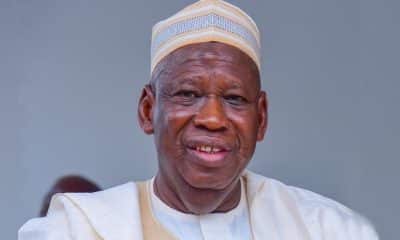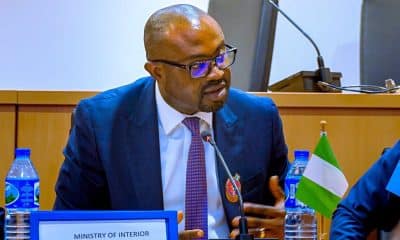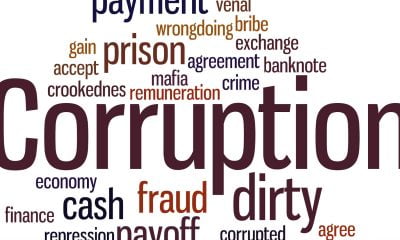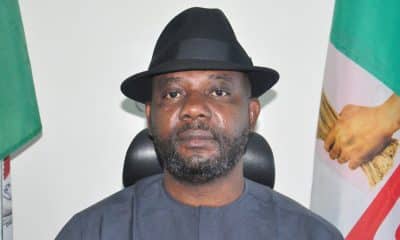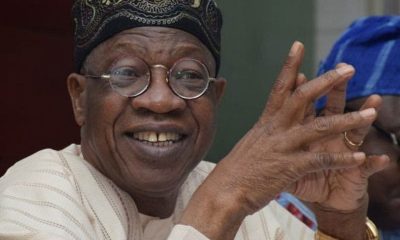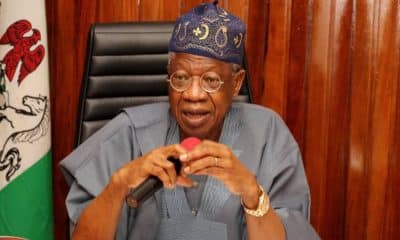Nigeria News
FG Reacts To Transparency International Corruption Index Report

The Federal Government has dismissed the 2020 Corruption Perception Index (CPI) rating by Transparency International which rated Nigeria very low in corruption.
Speaking on Thursday at a press conference in Abuja, Minister of Information and Culture, Lai Mohammed, said that the Muhammadu Buhari government will not take the rating seriously.
The minister asserted that the Buhari administration has implemented various anti-corruption policies that have impacted the economy and are yielding results for Nigerians to see.
Recall that the organisation had ranked Nigeria as the second most corrupt country in West Africa with the country occupying 149th position out of 180 countries of the world analyzed in the report.
According to the TI report, with 25 out of 100 points, Nigeria also dropped two places compared to the 2019 report where it scored 26 points and ranked 146th out of 180 nations and Nigeria’s ranking on the corruption perception index has continued to drop in the last four years.
Speaking further, Mohammed stated that the fight against corruption is like a marathon and not a sprint, calling on Nigerians to support the corruption fight.
He listed the Treasury Single Account (TSA), Integrated Personnel and Payroll Information System (IPPIS), Petroleum Industry Act (PIA), Financial Autonomy for State Legislature and Judiciary (2020), Whistle-blower Policy, Assets Recovery, Justice and Law Reforms as some of the policies implemented to curb corruption.
The minister, however, claimed these policies have stifled corrupt tendencies and also made corruption unattractive and costly to those who may want to engage in it.
He said: “As you are aware, one of the three major policy planks of this administration is the fight against corruption, with the others, of course, being to tackle insecurity and also to revamp the economy. We will be having a series of thematic press conferences on these issues in the days ahead, with this one — on the fight against corruption — being the first one.
“It is common knowledge that one of the most difficult tasks for any government is to fight corruption because when you fight corruption, corruption will fight you back. This explains why naysayers have continued to belittle or dismiss the administration’s anti-corruption efforts.
“Let me say here that fighting corruption is a marathon, and never a sprint. Also, investigations, arrests, prosecutions and asset forfeiture — which are the immediate, visible indices by which many measure success in tackling corruption, constitute as important as they are, just a part of the strategies to combat corruption. There is also a more fundamental strategy, which I will describe as structural and governance reforms or if you like, institutional reforms.
“Gentlemen, the Buhari administration has taken bold measures to streamline cumbersome bureaucratic processes in the implementation of government policies, check corrupt practices and ensure accountability in the implementation as well as delivery of these policies.
“These reforms are all-inclusive, cutting across all spheres of governance and not excluding even the private sector. They are the treasury single account (TSA), Integrated Personnel and Payroll Information System (IPPIS), Petroleum Industry Act (PIA), financial autonomy for state legislature and judiciary (2020), whistle-blower policy, assets recovery, justice and law reforms, Nigeria’s membership of the open government partnership as well as the various instruments at the disposal of the federal government to track, trace and stop the flow of illicit funds used in financing terrorist activities within Nigeria, among others.
“For those who may say that some of these reforms, like the TSA, predate this administration, our response is that what’s the use of a policy that is not implemented? This administration has implemented these reforms with fidelity, and the reforms have made a huge impact in preventing corruption.”

